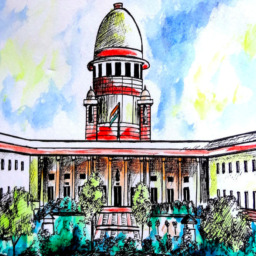INTRODUCTION
The Indian judiciary’s extremely slow model of justice delivery is not a new occurrence. The Indian courts have been notorious for sometimes even taking several years to deliver a judgement of a particular case. At present, according to the statistics of the National Judicial Data Grid, there are in total 3.7 crore pending cases in the district and subordinate courts, 58.5 lakh pending cases across all the high courts and 69 thousand cases pending in the Supreme Court. The worrying part is that the average rate of disposal of cases, which is around 1.8 million cases per year, is lower than the average number of new cases registered in the courts every year[1]. As a result, the judiciary system is overburdened.
One of the reasons cited for this overburden is the over-reliance on outdated and traditional modes of communication and exchange of information. Even today, our judicial system is completely functional on paper, all documents, files, etc are all in the traditional paper format. Since it’s paper it usually takes a long process to get approved. As a result, quick relief is not sought by people. As of today, in cases of bail, the following process is followed, first, the court hears the trial and when the bail is approved, a physical copy of the approval needs to be sent to the police station where the accused has been put behind bars.
Only when the police station receives these papers can the bail be officially granted and the accused is allowed to leave the prison. This method usually leads to several delays in the process due to various reasons. There is a high possibility that the police station is far away from the courts, especially when the case is being heard by the Supreme Court, the physical copy may take several days to reach from New Delhi to another state where the accused has been held.
Another matter of concern is many times, certain police stations have specific rules or guidelines they adhere to in case of bail procedures. For example, the Arthur Road jail in Mumbai receives all physical documents in the post box which is stationed right outside the prison. However, they have a policy that states that the post box will not be opened after 5:30 pm so any accused whose bail copy arrives post 5:30 in the mail would have to spend another night in prison only because the police officers refuse to open it. Such situations, unfortunately, happen more often than not which further questions the unfair practices of the judicial system that continue to be followed even today.
Recently, in July there was another case wherein 13 convicts in Agra were still in prison in spite of being granted bail four days earlier by the Apex Court. When this matter again reached the Court, a bench led by CJI N V Ramana took suo moto cognizance of the delay in releasing the convicts by the jail authorities in spite of the Court giving the bail approval[2]. The case is titled under the name ‘In re: delay in release of convicts after grant of bail’. While criticizing the poor judicial process, CJI Ramana quoted, “In this age of information and communication technology, we are still looking at the skies for the pigeons to communicate the orders”. [3] The three-judge bench led by CJI Ramana comprised of Justice Nageshwar Rao and Justice A S Bopanna also suggested that it was time we found an alternative to this method which would save time and further ensure that the accused are not being kept in jail only because the papers haven’t reached on time.
Along these lines, CJI Ramana has proposed a new and innovative scheme called ‘FASTER’[4]. FASTER stands for Faster and Secure Transmission of Electronic Records. Essentially through this new scheme, the judiciary seeks to eliminate the need for physical copies and instead go completely digital. The courts will now be providing an electronic copy of the bail orders, stay orders, interim orders and proceedings through emails to police stations. This in turn will help reduce the delay in the release of the convict which is caused due to the delay in the arrival of papers and would also be a secure and instantaneous mode of communication.
CJI Ramana has given the responsibility of formulating this scheme to the Secretary-General of the Supreme Court, Sanjeev Khalgaonkar along with the Solicitor General Tushar Mehta and amicus curiae of the Court Dushyant Dave, who will be representing the union government. Further, the bench has also asked all state governments to ensure that every police station has a stable internet connection. Alongside bail documents, the Apex Court also aims to digitize all files and records of the judiciary into secure e-files. To ensure that this is a secure mode without potential threats of hacking, the Court has directed the Director-General of the National Informatics Centre to take the necessary measures for the same. Further, the system proposes a secure communication channel between the two holders by suggesting measures like two-step verification and an automated delivery system.
The most recent case highlighting the issue was the infamous Aryan Khan case for drug abuse. In his case, in spite of getting a bail approved by the Bombay High Court, he had to stay in jail for an extra day because his papers were not ready for the police authorities for verification[5]. A similar instance was in the comedian Munawar Siddiquie case, even after receiving approval from the Supreme Court, since it took four days for the papers to reach Madhya Pradesh he was forced to spend those extra days in jail and was released only after a top judge called up the Indore police station asking for the same[6].
When the convicts of the North Delhi anti CAA riots, Devangana Kalita, Natasha Narwal and Asif Iqbal Tanha were given bail by the Supreme Court, once again due to delay of verification of documents by the Delhi police they were forced to stay for two extra days[7]. It is important to note that these cases were some of the most controversial cases of their times which made a place in the headlines of the newspaper every day, there are thousands of other cases where the same situation had occurred but was never brought to light.
CONCLUSION
On the surface level, this might seem like a trivial issue however being kept in prison even after being given bail is a violation of Article 21 of the Indian Constitution which guarantees the right to life and personal liberty. By not giving permission to leave the prison in spite of being given approval poses a threat to this fundamental right. This is a welcome move by the Apex Court to further protect the rights of prisoners. As William Goldstone, the former Prime Minister of England has rightly said, ‘Justice delayed is justice denied’ after all.
Author(s) Name: Shruti Gala (Bennett University, Greater Noida)
Reference:
[1] Pratik Datta,Suyash Rai, ‘How to Start Resolving the Indian Judiciary’s Long-Running Case Backlog’ (Carnegie Endowment For International Peace, September 9 2021) accessed 12 November 2021
[2] Abraham Thomas, ‘SC suo motu takes up delay in releasing prisoners after bail’ Hindustan Times (New Delhi, 16 July 2021)
[3] Express News Service, ‘ Looking for pigeons to communicate: Supreme Court plans electronic channel to send orders faster’ The Indian Express ( New Delhi, 17 July 2021)
[4] Harish V Nair, ‘ CJI NV Ramana’s innovation to ensure ‘FASTER’ release of prisoners granted bail’ TimesNow News ( India, 16 July 2021)
[5] Sahil Joshi, Saurabh Vaktania, ‘Formalities delay release, Aryan to spend another night in jail’ India Today (Mumbai, 30 October 2021)
[6] Express News Service, ‘Munawar Faruqui released on bail after late-night call from top court judge’ The Indian Express ( Bhopal, 7 February 2021)
[7] Soibam Rocky Singh, ‘Student activists freed after court rejects Delhi Police stand’ The Hindu (New Delhi 27 July 2021)















